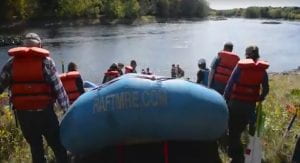Solutions Driven Watershed Science Overview
Dr. Sean Smith’s research seeks to understand the earth surface processes that shape the landscape, quantify watershed processes linked to socio-ecological services, and develop sustainability solutions to modern watershed, river, lake, and coastal management problems. A primary objective is to advance the prediction and mitigation of environmental impacts across varied spatial and time scales to guide watershed management and sustainability solutions.
Dr. Smith participates in multiple collaborative transdisciplinary research activities through the Watershed Process and Estuary Sustainability Research Group (WPES) he collaboratively co-leads. Projects consistently have a goal related to solving watershed, river, and coastal resource management problems with objectives focused on quantification of watershed conditions that influence surface flow characteristics, erosion, stream and river corridor dynamics, and related water quality loads to large rivers, lakes, and coastal estuaries. He has a joint appointment with the Mitchell Center for Sustainability Solutions and is a participating faculty in the Maine Agricultural and Forest Experimentation.
Collaborative stakeholder engaged projects have included the Maine Sustainability Solutions Initiative’s Safeguarding a Vulnerable Watershed, Safe Beaches and Shellfish Areas, and Future of Dams in New England projects, the latter two being part of the New England Sustainability Consortium. The solutions focused projects use field measurements, spatial data, and hydrologic models to quantify watershed processes linked to pollution problems identified, in part, through interactions with environmental agencies and communities in the region. Research activities typically involve other faculty, students, government agency scientists, and broad community of stakeholders interested in the identification and quantification of watershed processes linked to human activities and climate related changes in varied settings, as well as problematic culprits driving surface water runoff rates, water quality loads, and aquatic habitat impairments. Topics include land-sea connections, dam management, stream restoration, landscape alterations, rainfall runoff management, and climate change. The research is often framed around the development of the application of scientific methods to develop decision tools designed to address pollution and aquatic habitat problems.

Biophysical Research Focus Areas
- Fluvial and Watershed Geomorphology
- Sediment Transport, Load Estimation, Budgeting
- Watershed Hydrology and Water Quality Load Estimation
- Coastal Land – Sea Connectivity
- Watershed Management and Sustainability Solutions
- Stream, River, Lake, Coastal Assessment and Restoration